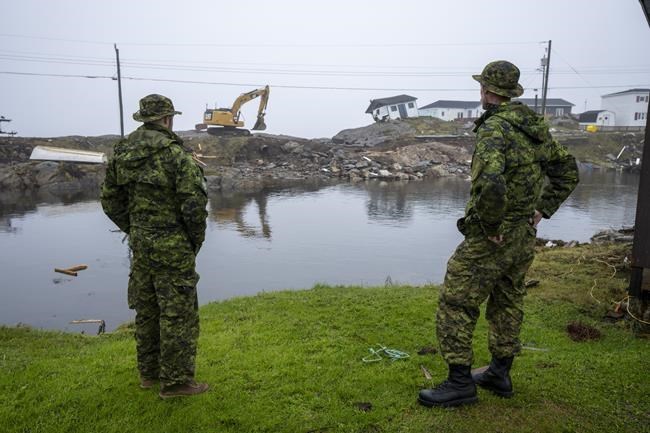OTTAWA — The Canadian Armed Forces is too often the first choice when it comes to responding to natural disasters like hurricanes, Canada's top military commander said Thursday.
Chief of the defence staff Gen. Wayne Eyre told a parliamentary committee that governments at all levels need to build additional capacity at the provincial or municipal level to respond.
“With the increasing frequency and intensity of these natural disasters, we're being called upon more and more to respond not necessarily as a force of last resort, but in some cases the force of first choice,” he said.
Eyre was speaking as hundreds of Canadian troops are on the ground in Nova Scotia, Prince Edward Island and Newfoundland and Labrador helping communities recover from Hurricane Fiona.
Fiona battered Atlantic Canada in late September and has sparked fresh calls for the federal, provincial and municipal governments to better plan and prepare for natural disasters as they become larger and more numerous.
The head of the Canadian Red Cross this week called for less reliance on the military and more investments for what some are calling a national “humanitarian workforce” of civilians that is ready to respond to disasters and other emergencies.
Eyre has previously expressed concern that the country’s reliance on the military for domestic situations is negatively affecting its ability to train and prepare for other missions, which include defending Canada from a potential attack.
The growing demands also coincide with a severe shortage of military personnel, which prompted Eyre to issue a sweeping order to senior commanders on Thursday to end all non-essential activities in favour of boosting recruitment and retention.
Eyre said a civilian disaster response organization would need many of the same capabilities as the military, including an organized labour pool and the ability to deploy and support itself.
“That's the real value of what we provide,” he told the committee. “And any similar organization, any supplementary organization should provide the same capacity or the same type of attributes.”
He also acknowledged that the Armed Forces will always need to be ready to respond to requests for assistance at home as its primary job is to protect Canadians.
“Given the extents of the disasters that we're facing, we still have to be that force of last resort,” he said. “The Canadian Armed Forces still has to has to be there as the ultimate insurance policy for this country if there is not sufficient capacity.”
The defence chief was at the committee to discuss the threat posed by Russia, during which he painted a bleak picture about the security situation around the world thanks to both Moscow and China.
“Russia and China are not just looking at regime survival, but regime expansion,” he said. “They consider themselves to be at war with the West.”
He added that the greatest threat to both governments is from their own populations, and that they are trying to undermine liberal democracies and the credibility of western institutions “to ensure our model of government is seen as a failure.”
Eyre later said that the rules-based international order that has sustained relative peace and security since the end of the Second World War is “faltering. It needs to be defended. The gravity of these times should be apparent for all.”
This report by The Canadian Press was first published Oct. 6, 2022.
Lee Berthiaume, The Canadian Press




